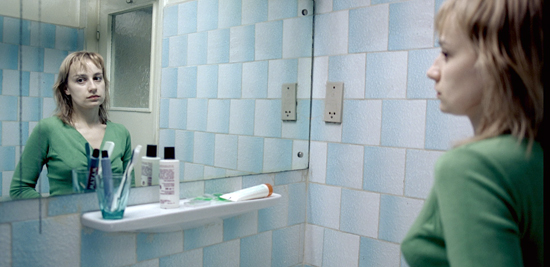

Reviews of Recent Independent, Foreign, & Documentary Films in Theaters and DVD/Home Video
Written & Directed by Cristian Mungiu Produced by Oleg Mutu & Mungiu Director of photography, Oleg Mutu Edited by Dana Bunescu Released by IFC Films/Red Envelope Entertainment Language: Romanian with English subtitles Romania. 113 min. Not Rated With Anamaria Marinca, Vlad Ivanov, Laura Vasiliu, Alex Potocean & Luminita Gheorghiu
Grainy and frequently filmed under severe florescent lighting (fitting for the subject matter to come), the film’s unvarnished and vérité-like look belies writer/director Christian Mungiu’s well-calibrated script. Set in 1987, two years before the violent overthrow of Romania’s communist government, the relentlessly drab production design mirrors last year’s East Berlin-set The Lives of Others. By not spelling out what’s actually at hand, the indirect storytelling increases the horrific inferences; Otilia secures for the nearly numb Gabita the services of an inexpensive and rudimentary abortionist, Mr. Bebe (Vlad Ivanov), the antithesis of Mike Leigh’s maternal title character Vera Drake. No tea and sympathy here. The pudgy, middle-aged Mr. Bebe is one of the most frightening misogynists on film. His work is all about the money, performed with a heavy dose of judgment. During the young women’s negotiation for his services, he hardly moves, his voice an even keel; he knows he doesn’t have to exert much effort – he holds all the cards, which is painfully realized by Otilia. In the dingy settings, what’s implied becomes even more appalling, if not gruesome. Anyone who’s been the least cognizant since 1973 will at once understand the issues at hand. The time and place never feel removed, perhaps due to the intimacy of the direction and the intensity of the story. Male or female, you will squirm and look away. But the director, at a crucial plot point, is on to you, and quickly tilts the camera to reveal what you’ve been relieved not to have seen thus far. (Instead of the dark at the top of the stairs, like in another type of horror film, it’s the hotel bathroom you’ll want Otilia to avoid.) Mungiu presents the issues surrounding abortion more sinuously than in Leigh’s engrossing but schematically rigid film, which is a cake walk compared to this. Before you know it, Mungiu has woven in many points of view, and never does he back down; his film is unquestionably about abortion. During the communist era, abortion was outlawed in Ceausescu’s effort to bolster Romania’s population; 500,000 women were believed to have died as a result of illegal abortions. Now legal, 300,000 are reported annually in a population of 22 million.
Stylistically, 4 Months is a lot like other acclaimed films in the so-called Romanian New Wave, The Death of Mr. Lazarescu and
12:08 East of Bucharest. (Cinematographer Oleg Mutu also shot Lazarescu). By far, 4 Months is the most visceral, leaving
hardly any breathing room for the audience. But one lingering question remains – why would anyone want to see this, besides film buffs wanting to see
last year’s Palm d'Or winner? Though undeniably harsh, the film doesn’t lack heart. The camera constantly keeps company with Otilia,
seemingly in real time. Over the long haul of one dreadful day and night, the film becomes empathetic, not misanthropic.
Kent Turner
|